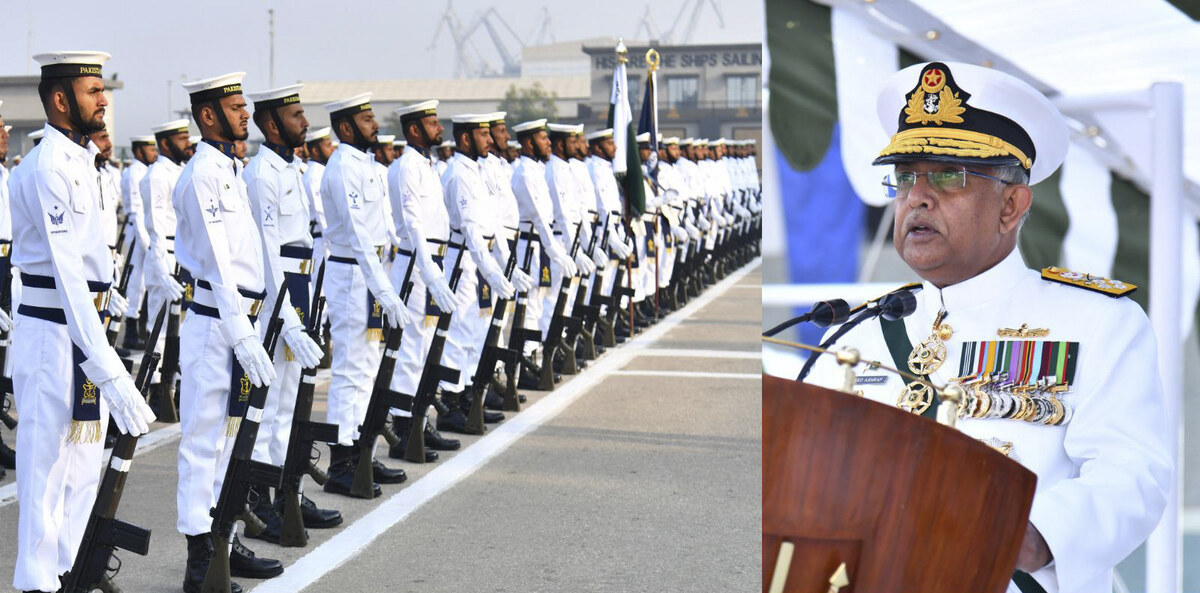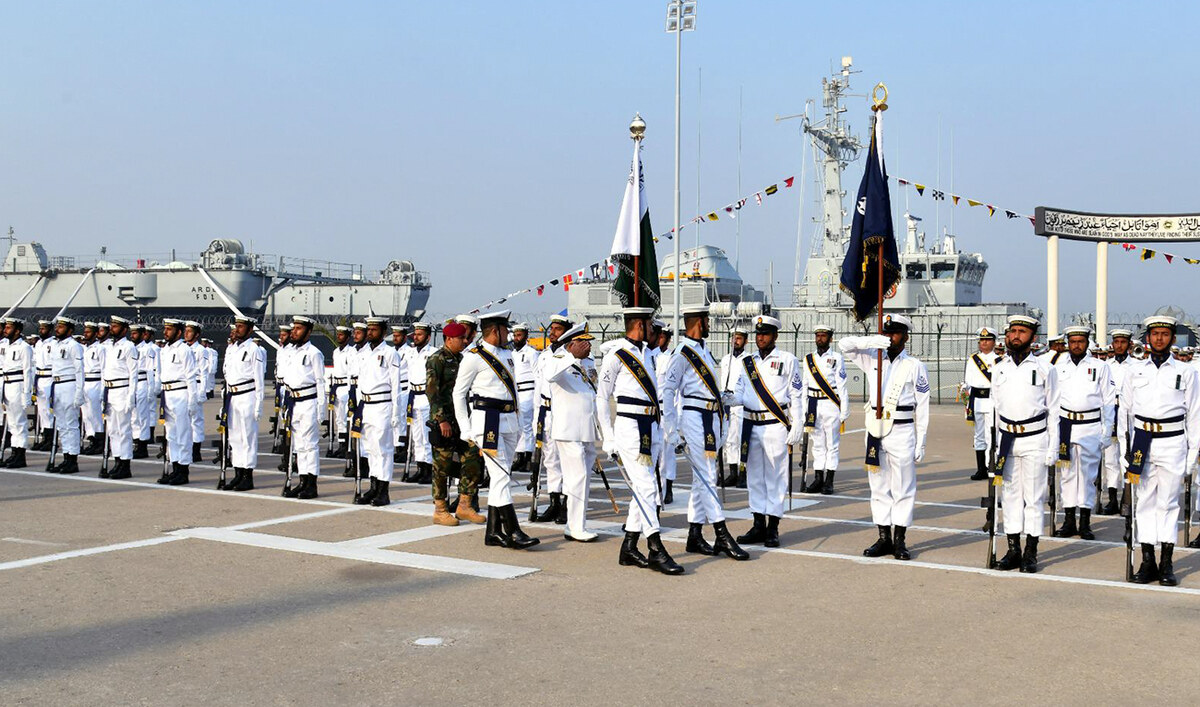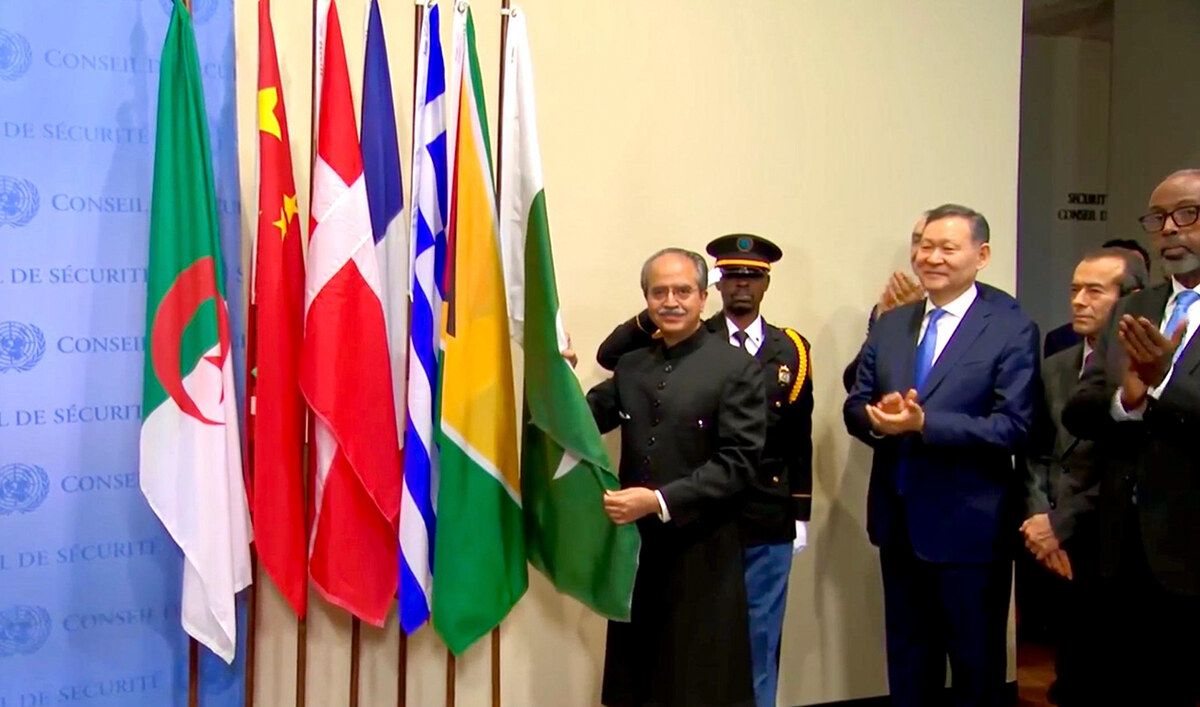ISLAMABAD: Pakistan and the United Kingdom (UK) expect a major boost in bilateral trade between the two countries, the Pakistani commerce ministry said on Monday, following the arrival of British Trade Commissioner Oliver Christian in Islamabad on a three-day visit.
Christian, who serves as the Trade Commissioner for the Middle East and Pakistan as well as the UK counsel general to Dubai, landed in Islamabad over the weekend on his first-ever trip to strengthen economic and trade links with Pakistan.
He has facilitated over £78 billion in investment and export deals apart from playing a key role in launching the UK Global Investment Summit and the Office of Investment, according to the British high commission in Islamabad.
On Monday, the UK trade commissioner, met with Pakistan’s Commerce Minister Jam Kamal to explore avenues to enhance bilateral trade, the Pakistani commerce ministry said.
“The meeting highlighted the need for sectoral collaboration and a business-to-business matchmaking approach to target growth areas in both countries,” it said in a statement. “Jam Kamal emphasized Pakistan’s immense potential in the food sector, particularly through value addition.”
Kamal underscored his government’s commitment to expanding trade and Prime Minister Shehbaz Sharif’s plan to achieve an ambitious export growth target of $60 billion from the existing $30 billion. He highlighted Pakistan’s success in organizing an International Food and Agriculture Exhibition in Karachi on Aug. 9-11, where more than 800 foreign delegates participated.
“This was the first event of its kind, with such a large international presence and it opened doors to significant business opportunities,” the minister said.
Citing Pakistan’s growing exports in information technology, mining, horticulture and dairy, Kamal discussed the potential for future exports, including olive products. “Pakistan is on its way to becoming a significant olive exporter, with vast cultivation underway,” he shared.
The UK trade commissioner acknowledged Pakistan’s vast potential and assured full support for increasing the trade volume between the two nations, according to the Pakistani commerce ministry. Both sides emphasized the importance of the UK-Pakistan Trade Dialogue, a platform to be established soon to promote trade and investment.
As the UK diversifies its import sources post-Brexit, Kamal highlighted Pakistan’s potential to become a key supplier of food products to the UK, given its compliance with international standards.
Pakistan and the UK have a long and multifaceted relationship, with the latter hosting a large Pakistani diaspora community. Prime Minister Shehbaz Sharif also accepted an invitation by King Charles III over a telephone call last week to attend the Commonwealth Heads of Government Meeting in Samoa next month from October 21-26.
Earlier this month, Pakistan’s deputy premier Ishaq Dar also embarked on a five-day official visit to London, where he held wide-ranging discussions with the new British administration.
During his visit, Christian will announce significant new partnerships, including a strategic transnational education agreement between Beaconhouse International College and the University of Essex, the British high commission said on Sunday. The partnership with Essex University aimed to provide Pakistani students access to world-class education in business, computing and law subjects, it added.
The high commission said Britain’s Imperial College Healthcare NHS Trust partnered with Novacare hospitals to set up a 250-bed hospital in Islamabad, which would open in 2026 and offer 28 clinical services along international standards.
Terming Pakistan as the third-largest trade partner, British Deputy High Commissioner Sarah Mooney said on Sunday the UK was committed to “driving economic development,” while addressing challenges that “hold back growth.”
“This visit reinforces our commitment to working together to unlock opportunities to benefit both countries,” she said.
Christain said British firms operating in Pakistan were market leaders in their respective fields that were “trusted by millions of consumers.”
“We are dedicated to strengthening our economic relationship with Pakistan, not just through investments and partnerships but by working together to demonstrate the opportunity here for UK businesses,” he said.
The high commission said the UK was Pakistan’s third-largest export market, with the total trade amounting to $5 billion in the four quarters leading up to the end of 2024.
Pakistan, UK eye major trade boost amid high-ranking British official’s visit to Islamabad
https://arab.news/jwnfe
Pakistan, UK eye major trade boost amid high-ranking British official’s visit to Islamabad

- Oliver Christian has facilitated over £78 billion in investment and export deals apart from playing a key role in launching the UK Global Investment Summit
- In meeting with Pakistan’s commerce minister, the UK trade commissioner acknowledged Pakistan’s potential and assured support for increasing trade volume
Pakistan launches IT training portal with Huawei to build digital skills among youth

- Shaza Fatima Khawaja says it is vital to equip Pakistani youth with necessary skills to bolster the economy
- The training program will use Huawei’s resources and global expertise to deliver comprehensive education
ISLAMABAD: State Minister for Information Technology Shaza Fatima Khawaja on Friday stressed the importance of equipping youth with digital skills as the IT ministry, in collaboration with Huawei, launched a training portal to develop a more technologically skilled workforce, the state media reported.
The government views information technology as a driver of economic change, seeking to transform the sector into a cornerstone of its strategy for financial stability. Pakistan has earmarked IT as a priority sector, courting foreign investment from countries like China and the Gulf states.
“The main objective of this program is to impart training to our youth, making them eligible for jobs and enabling them to contribute to the country’s development,” Khawaja was quoted by the Associated Press of Pakistan as saying at the launch of the portal.
“To bolster the economy, it is essential to equip our young population with the necessary training and skills,” she added.
The minister emphasized the importance of IT in the modern age, pointing out that the government was also setting up e-employment centers and e-libraries.
Highlighting the country’s potential in the field, Khawaja noted that over 150 million young people in Pakistan were under 30, adding that they could play a critical role in driving economic progress.
The minister announced the formation of a National IT Skills Committee, comprising representatives from IT boards and provincial ministries, to strengthen governance and coordination in the sector.
Huawei’s Deputy CEO Ahmed Bilal Masud highlighted the company’s commitment to fostering digital literacy and bridging the gap between academic knowledge and industry needs.
“By investing in the future of our youth, we are paving the way for a skilled workforce that will drive Pakistan’s economic growth and technological advancement,” he said.
He informed that the training program would utilize Huawei’s extensive resources and global expertise to deliver comprehensive education for students and trainers, aiming to enhance ICT education nationwide and promote digital transformation in Pakistan.
Pakistan naval chief lauds fleet readiness, highlights role in securing vital maritime zones

- Admiral Naveed Ashraf witnesses Pakistan Navy’s annual efficiency competition parade in Karachi
- Ashraf praises officers and sailors for achieving the operational objectives and milestones in 2024
ISLAMABAD: Chief of the Naval Staff Admiral Naveed Ashraf on Friday expressed satisfaction with the operational readiness of Pakistan’s fleet, highlighting its critical role in safeguarding strategic maritime zones, including Gwadar Port developed under the China-Pakistan Economic Corridor (CPEC), to boost trade and regional connectivity.
The Gwadar Port, a vital link in Pakistan’s efforts to enhance regional trade, has been at the center of the country’s push to convince landlocked Central Asian states to utilize its ports for international trade via sea lanes.
The navy has also been instrumental in fostering the development of Pakistan’s blue water economy, ensuring maritime security and facilitating economic growth.
“Chief of the Naval Staff expressed complete satisfaction and confidence in the operational readiness of Pakistan Navy Fleet,” the navy said in a statement after holding fleet annual efficiency competition parade. “He lauded the dedication and professionalism of officers and sailors in safely and efficiently achieving the operational objectives and milestones for the year 2024.”

“He highlighted Pakistan Navy’s efforts to ensure the security of strategic maritime zones, particularly Gwadar Port and maritime projects under CPEC,” it added.
The parade was held at the dockyard in Karachi. The naval chief attended the event as the chief guest and elaborated on the evolving maritime security challenges in the region.

He also stressed the need for the navy to remain vigilant and prepared to counter any threats to Pakistan’s maritime boundaries.
Earlier, Commander Pakistan Fleet Rear Admiral Abdul Munib, in his welcome address, highlighted the fleet’s operational achievements over the past year.
Awards and trophies were presented to the best-performing squadrons and units during the ceremony, recognizing their exemplary contributions to the navy’s operational success in 2024.
Pakistan pledges support for occupied peoples as it joins Security Council as non-permanent member

- Senior Pakistani diplomat at the UN highlights the significance of multilateralism in tacking global challenges
- Pakistan plans to actively pursue just solutions to issues on the council’s agenda, help with conflict prevention
ISLAMABAD: Pakistan reaffirmed its commitment to being a strong voice for people under foreign occupation as it raised its flag at the United Nations on Thursday, marking the beginning of its two-year term as a non-permanent member of the UN Security Council.
This is the eighth time Pakistan has secured a seat as a non-permanent UNSC member since joining the world body in 1947. The 15-member council comprises five permanent members — the United States, Russia, China, the United Kingdom and France — along with 10 non-permanent members elected for two-year terms.
Non-permanent members play a crucial role in shaping global discussions on peace and security and in influencing the drafting of resolutions.
“Pakistan will continue to be guided by the purposes and principles of the UN Charter, including maintenance of international peace and security and development of friendly relations among nations based on the principle of equal rights and self-determination,” Ambassador Asim Iftikhar, Pakistan’s Alternate Permanent Representative to the UN, said during the flag-raising ceremony.

“Pakistan will always remain a strong voice for peoples under foreign occupation and oppression for the realization of their right to self-determination,” he added.
Iftikhar said the flag ceremony symbolized democratic renewal through the periodic rotation of the UNSC membership, reinforcing the global aspiration for a Security Council that “is more effective, open and transparent, and accountable to the UN membership.”
He also highlighted the importance of multilateralism in tackling global challenges.
“We are convinced that cooperative multilateralism – with the UN at its core – is the best way of tackling the multifaceted challenges of today,” he said.

The Pakistani diplomat called for addressing the root causes of conflicts, prioritizing dialogue and diplomacy and supporting confidence-building measures at regional and global levels to foster peace and stability.
He also pledged that his country will actively pursue just solutions to issues on the council’s agenda and to contribute to conflict prevention and peacekeeping efforts.
“Never forgetting our solemn duty toward the millions of men, women, and children suffering in conflicts, Pakistan is assuming this responsibility, fully resolved to our collective endeavor for a more peaceful and secure world,” he said.
Pakistan PM blames ‘external hand’ for militant violence, urges coordinated action on security

- Shehbaz Sharif asks federation, provinces and army to formulate a security strategy at the earliest
- Military says security forces have killed 925 militants last year in 59,775 operations across Pakistan
ISLAMABAD: Prime Minister Shehbaz Sharif on Friday blamed external forces for the surge in militant violence in Pakistan, urging a unified approach involving federal and provincial authorities along with the military to tackle the crisis.
Pakistan’s northwestern Khyber Pakhtunkhwa and southwestern Balochistan provinces witnessed a spike in deadly militant attacks last year. Groups such as the Pakistani Taliban and other militant and separatist factions have targeted security convoys, checkpoints and carrying out daily killings and kidnappings of law enforcement personnel and government functionaries.
Officials in Islamabad have frequently accused Afghanistan of enabling “cross-border attacks,” a claim rejected by Kabul, which insists Pakistan’s security challenges are an internal matter.
Pakistan has also pointed fingers at India for stoking unrest in Balochistan, an allegation dismissed by New Delhi.
“In certain areas of Khyber Pakhtunkhwa and Balochistan, the conspiracies being woven against Pakistan involve an external hand,” Sharif said while addressing the apex committee meeting of the National Action Plan in the federal capital. “We are well aware of the countries providing assistance [to militant groups].”
The prime minister emphasized closer cooperation among the Pakistani authorities to defeat militancy.
“I would only request that if the provinces, along with the federation and the Pakistan Army, could make a plan,” he said. “I feel we have to discuss how to eliminate this [militant violence].”
Sharif stressed that Pakistan’s success in different domains depended on improved law and order and the complete elimination of militants.
“Unity of thought and action” among stakeholders, he noted, was essential to thwarting militant schemes aimed at destabilizing the country.
The meeting was attended by Army Chief Gen. Asim Munir, DG Inter-Services Intelligence Lt. Gen. Asim Malik, federal ministers and all provincial chief ministers.
Last month on December 27, military spokesman Lt. Gen. Ahmed Sharif Chaudhry reported that 925 militants were killed in 59,775 operations across the country in 2024, with the majority in Khyber Pakhtunkhwa and Balochistan.
Militant attacks have surged in Pakistan since November 2022, following the collapse of a fragile truce between Islamabad and the Tehreek-e-Taliban Pakistan (TTP).
Ethnic Baloch separatists are also engaged in a decades-long struggle for independence, accusing the central government of exploiting the province’s natural resources.
Young Maphaka makes debut as South Africa win toss and bat 1st in 2nd Test against Pakistan

- The 18 years and 270 days old broke Paul Adams’ South Africa record of youngest Test player
- South Africa made three changes after sealing its place in June’s World Test Championship final
CAPE TOWN: Kwena Maphaka became the youngest South African to make a Test debut as the Proteas won the toss and elected to bat in the second and final Test against Pakistan on Friday.
The 18 years and 270 days old Maphaka broke Paul Adams’ South Africa record of youngest Test player, who played his first Test against England in 1995 at the age of 18 years and 340 days.
South Africa made three changes after sealing its place in June’s World Test Championship final with a dramatic two-wicket win in the first Test at Centurion inside four days.
Australia, India and Sri Lanka all still in the race for the Lord’s WTC final against South Africa in June. Australia could advance to face South Africa if it wins the fifth Test against India in Sydney.
“It’s hot and we expect the wicket to break up,” South Africa captain Temba Bavuma said at the coin toss. “We’ve had time to wrap around what we’ve achieved, the preparations for this Test have been the priority … a chance to finish off with a good note.”
Fast bowler Mohammad Abbas brought Pakistan close to its first Test win in South Africa in 18 years with 6-54 in the second innings at Centurion but tailenders Kagiso Rabada and Marco Jansen shared a half century ninth-wicket stand and quashed the visitors hopes.
The home team, which has six successive Test wins, opted to go with the express pace of Maphaka in place of Dane Paterson, who was dropped after picking up his second successive five-wicket haul at Centurion.
Corbin Bosch was left out after making a stunning Test debut in the first Test where he took a wicket with his first ball and then made a scintillating unbeaten half century in the first innings which gave South Africa a match-winning lead of 90 runs.
Left-arm spinner Keshav Maharaj has recovered from a groin injury and replaced Bosch. Opening batter Tony de Zorzi had a thigh strain and was replaced by Wiaan Mulder as the all-rounder recovered from a finger injury and returned to the playing XI.
Pakistan, which has won just two of its last nine Test matches in this WTC cycle, once again went without a specialist spinner. It rested fast bowler Naseem Shah and brought in left-arm fast bowler Mir Hamza.
“A bit less grass than usual, but we would have had a bowl,” Pakistan captain Shan Masood said.










